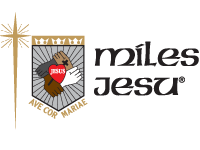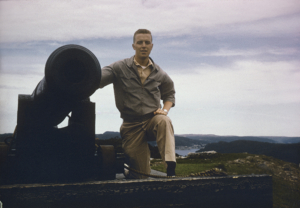 This is a story of a young man who belongs to this modern era. He was born and brought up in modern America, had a job and enjoyed friends and sports and fun living as a modern American. There was something special about him, and the people whose lives he touched speak of him with unusual joy, delight, and affection. He brought them closer to God. He lived and served as though genuine and sincere love of God, and of neighbor, really mattered. He didn’t have a halo, and in his busy everyday life he didn’t look like a plaster statue in a church or a picture in a stained-glass window. He died while he was still quite young, but no one who met him ever seems to have forgotten him. Those who worked closely with him, and knew him well, and whose lives were bound up with his, found themselves talking about him – and still talk about him – as an extraordinary man. This is his story
This is a story of a young man who belongs to this modern era. He was born and brought up in modern America, had a job and enjoyed friends and sports and fun living as a modern American. There was something special about him, and the people whose lives he touched speak of him with unusual joy, delight, and affection. He brought them closer to God. He lived and served as though genuine and sincere love of God, and of neighbor, really mattered. He didn’t have a halo, and in his busy everyday life he didn’t look like a plaster statue in a church or a picture in a stained-glass window. He died while he was still quite young, but no one who met him ever seems to have forgotten him. Those who worked closely with him, and knew him well, and whose lives were bound up with his, found themselves talking about him – and still talk about him – as an extraordinary man. This is his story
The Murphys were typical of a type of Catholic family that thrived in the America of the 1940s and 1950s. They were a large family – nine boys! – and were confident in their Catholic identity. A number of things made this family stand out. For one thing, among the nine boys were no less than three sets of twins – Kevin and Frank, James (Jim) and Paul, and Don and Bob. And all the boys were impressive athletes and sportsmen. They enjoyed ice hockey, American football, and running, and they brought home lots of trophies. The cold Chicago winters always saw them ice-skating with relish – Paul always beating Jim in racing on the ice, just as Jim invariably beat Paul when they were running on land. Jim in due course became captain of the school football team. Older brother Dave became a captain of the track-running team at the University of Notre Dame. Paul – younger than Jim by just a few minutes (their joint birthday was April 24th, 1939) – was the youngest of the family and had plenty of role-models to follow.
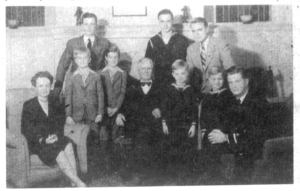 The family were not just “Sunday Catholics”. The Faith was lived out in everyday life, and Edward and Dorothy Murphy were dedicated and committed to the beliefs, values and moral teachings of the Church. As the father of a large family, Edward Murphy worked hard. He was a successful businessman and an energetic and dedicated parent. He was also sincerely devout, attending Mass every morning before going to work. The boys were taught to be helpful and outgoing – their mother was emphatic about good manners, neighborliness, and a spirit of service. As they grew old enough to become altar servers at Mass, they did so with enthusiasm, and followed their father in getting up early to go to church.
The family were not just “Sunday Catholics”. The Faith was lived out in everyday life, and Edward and Dorothy Murphy were dedicated and committed to the beliefs, values and moral teachings of the Church. As the father of a large family, Edward Murphy worked hard. He was a successful businessman and an energetic and dedicated parent. He was also sincerely devout, attending Mass every morning before going to work. The boys were taught to be helpful and outgoing – their mother was emphatic about good manners, neighborliness, and a spirit of service. As they grew old enough to become altar servers at Mass, they did so with enthusiasm, and followed their father in getting up early to go to church.
As they grew up, the boys made decisions about their future. Paul’s twin, Jim, had wanted to be a priest since early boyhood. Paul was keen to study architecture, and the University of Notre Dame had good Architecture Department which offered exactly the courses he wanted. It was the beginning of what was to become a highly successful professional career. He also made a specific contribution to the life of Notre Dame. At that time, there was no official Honor Society at the University for architecture students, and one of the neighboring universities approached Notre Dame about founding a chapter of Tau Sigma Delta, the national Honor Society for architects. Paul was instrumental in getting the Notre Dame chapter up and running, and is listed as a charter member along with James Cassidy and a group of others. James and Paul became good friends. In due course Paul would be Best Man at James’ wedding, and godfather to his son.
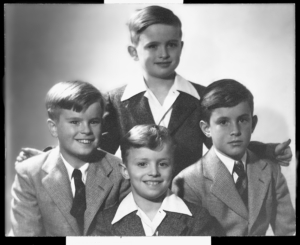 Among those who knew Paul during his college days, there is the sense of a young man full of zest for life. He was not focused on himself, but was always interested in others and how they were doing. He was fun to be with, and seemed to give people a sense of moral “lift” – somehow, everyone felt better after some time in his company. A childhood friend who met up with him again in college days went on to become a nun – Sister Theresa of Christ the King. She remembers those times: “It was in college that our paths crossed again occasionally, since we went around in a group that included a lot of the old neighbors and school friends, and we all met when we were home for holidays. At college, when we met at parties, we’d always swap news about our families. Paul was always full of life and full of fun. He was very enthusiastic about his architectural studies, and one of my friends told me about a beautiful display that he did at Notre Dame.” Sister Theresa also remembers that Paul somehow always made social gatherings worthwhile – conversation could never get sordid or unwholesome in his company, nor did it slide into pointless gossip. His faith, his affection for his family, and his joy in sincere friendships – all this shone through and made other people also love the things in life that really matter.
Among those who knew Paul during his college days, there is the sense of a young man full of zest for life. He was not focused on himself, but was always interested in others and how they were doing. He was fun to be with, and seemed to give people a sense of moral “lift” – somehow, everyone felt better after some time in his company. A childhood friend who met up with him again in college days went on to become a nun – Sister Theresa of Christ the King. She remembers those times: “It was in college that our paths crossed again occasionally, since we went around in a group that included a lot of the old neighbors and school friends, and we all met when we were home for holidays. At college, when we met at parties, we’d always swap news about our families. Paul was always full of life and full of fun. He was very enthusiastic about his architectural studies, and one of my friends told me about a beautiful display that he did at Notre Dame.” Sister Theresa also remembers that Paul somehow always made social gatherings worthwhile – conversation could never get sordid or unwholesome in his company, nor did it slide into pointless gossip. His faith, his affection for his family, and his joy in sincere friendships – all this shone through and made other people also love the things in life that really matter.
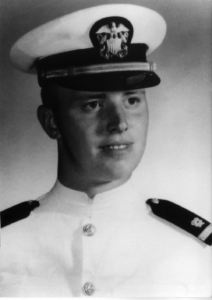 Paul’s studies went well and he graduated with great success. It was 1961 and full adult life now stretched before him. He signed up for the United States Navy, joining a squadron that was responsible for designing and building the various bases that the Navy needed. In due course he became a Lieutenant. The life was an exciting and satisfying one, and Paul was talented and good at his work: architecture was something he loved. He sailed to many different parts of the world, and the next three years were to be enjoyable ones. Sister Theresa remembers meeting Paul’s father and catching up on the family’s news: “He was telling me how the boys were just so busy, they could hardly keep up with things. When I asked how Paul was, he said ‘Oh, Paul is my bright ray of sunshine. He is in the Navy with the Seabees, and he told me “Dad, we’re building the world!”
Paul’s studies went well and he graduated with great success. It was 1961 and full adult life now stretched before him. He signed up for the United States Navy, joining a squadron that was responsible for designing and building the various bases that the Navy needed. In due course he became a Lieutenant. The life was an exciting and satisfying one, and Paul was talented and good at his work: architecture was something he loved. He sailed to many different parts of the world, and the next three years were to be enjoyable ones. Sister Theresa remembers meeting Paul’s father and catching up on the family’s news: “He was telling me how the boys were just so busy, they could hardly keep up with things. When I asked how Paul was, he said ‘Oh, Paul is my bright ray of sunshine. He is in the Navy with the Seabees, and he told me “Dad, we’re building the world!”
While on a posting to Spain, Paul heard from one of his older brothers, Don. All the Murphy boys had remained close even though they were now working and studying in different parts of America or the wider world. Don had joined a Catholic group called “Miles Jesu”, one of what later came to be known as the “New Movements” in the Church. It was involved with short courses, known as “Cursillos in Christianity”, aimed at reviving and inspiring Catholics in their faith. Don’s interest and enthusiasm were infectious. Paul’s Navy service was due to finish shortly. When it did, he flew out to join Don in Phoenix, Arizona, and attended one of these courses
Always devout, Paul now found something new and thrilling. The year was 1965 and many changes were in the air. The post-war generation was asking questions, and the Church was seeking to respond in new ways to new challenges. For many, over the next years, there would be confusion and uncertainty in what had seemed to be the rock-solid truths of the Catholic Faith. But the Cursillo retreat was not part of this: it was rooted in a traditional and authentic Catholicism that was intellectually and morally satisfying. As the retreat began, Paul Murphy met Father Alphonsus Duran, one of the founders of Miles Jesu. Immediately, the priest recognized in the tall young man something special and significant. He was open and eager to give himself generously in service to God.
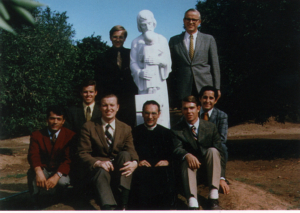 Later, when the retreat was over, the priest was aware that the young man had made a deep commitment to God in a new and important way. He felt called to ask him about what he wanted to do. Did he really seek only the will of God in all things? This is the sort of question to which it is easy to answer “yes” in a glib and even superficially pious way, because that is what seems expected. But Fr. Duran pursued the question. What if the will of God was that Paul should be a priest? He already knew that Paul did not want to be one, but Paul answered perfectly sincerely that he would do it. “Do you like it?” “No” “Then why are you going to do it?” “Because I am not going to do my will but the will of God.” Fr. Duran then changed tack and suggested that God’s will might be that Paul should marry and raise a family. This time, Paul said that the idea certainly appealed. But was that his real motive in saying “yes” to the idea? Paul was solemn and emphatic in his response “I am not going to do my own will, but the will of God.” The idea of doing sincerely what God wanted – and only what God wanted – was evidently the one thing that mattered to Paul Murphy. After some further discussion, Fr. Duran made another suggestion: that Paul continue with his plan of becoming an architect, but give his life over wholly to God. This would mean giving up personal possessions – taking a vow of poverty – and giving up the idea of marriage and a family, choosing instead to live a celibate life, serving God and his fellow-men with complete unselfishness, under a vow of obedience. This struck a chord deep inside Paul. It was what he knew that he really was called to do. Later he would say “I felt like everything fell into place”. He wept. He had found his life’s vocation.
Later, when the retreat was over, the priest was aware that the young man had made a deep commitment to God in a new and important way. He felt called to ask him about what he wanted to do. Did he really seek only the will of God in all things? This is the sort of question to which it is easy to answer “yes” in a glib and even superficially pious way, because that is what seems expected. But Fr. Duran pursued the question. What if the will of God was that Paul should be a priest? He already knew that Paul did not want to be one, but Paul answered perfectly sincerely that he would do it. “Do you like it?” “No” “Then why are you going to do it?” “Because I am not going to do my will but the will of God.” Fr. Duran then changed tack and suggested that God’s will might be that Paul should marry and raise a family. This time, Paul said that the idea certainly appealed. But was that his real motive in saying “yes” to the idea? Paul was solemn and emphatic in his response “I am not going to do my own will, but the will of God.” The idea of doing sincerely what God wanted – and only what God wanted – was evidently the one thing that mattered to Paul Murphy. After some further discussion, Fr. Duran made another suggestion: that Paul continue with his plan of becoming an architect, but give his life over wholly to God. This would mean giving up personal possessions – taking a vow of poverty – and giving up the idea of marriage and a family, choosing instead to live a celibate life, serving God and his fellow-men with complete unselfishness, under a vow of obedience. This struck a chord deep inside Paul. It was what he knew that he really was called to do. Later he would say “I felt like everything fell into place”. He wept. He had found his life’s vocation.
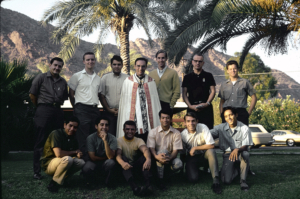 As a member of Miles Jesu, Paul proved himself hardworking, dedicated and popular. The main contribution that he made to everyone’s lives was that he made people laugh. He was fun – he cheered people up. He had the ability to lift a dreary moment or make something ordinary seem enjoyable and light-hearted. In addition, like all really good-hearted people, he never minded being on the receiving end of other people’s jokes. Another of Paul’s characteristics was his good looks. Over six feet tall, he carried himself well and was extremely fit. Among the sports he loved was water-skiing. He was extremely happy in Miles Jesu and his joy in his chosen life was infectious. He believed in working hard, and demanding much from himself – he wanted to be tough, physically, mentally, and spiritually. This was combined with extraordinary courtesy and a great ability to put people at their ease. He took care about things like chatting to visitors who might be ill at ease, and remembering people’s birthdays and anniversaries. He had a pleasant and open approach to everyone. It might be thought that a community of men, dedicated to hard work and prayer in lifelong celibacy, might be awkward in the company of women: Paul ensured that it was not. His open, easy style, which others unconsciously imitated, meant that women felt comfortable with him and with Miles Jesu members generally. There was always pleasantness, friendship, conviviality, and laughter. He set a tone that meant that the whole community adopted the right approach.
As a member of Miles Jesu, Paul proved himself hardworking, dedicated and popular. The main contribution that he made to everyone’s lives was that he made people laugh. He was fun – he cheered people up. He had the ability to lift a dreary moment or make something ordinary seem enjoyable and light-hearted. In addition, like all really good-hearted people, he never minded being on the receiving end of other people’s jokes. Another of Paul’s characteristics was his good looks. Over six feet tall, he carried himself well and was extremely fit. Among the sports he loved was water-skiing. He was extremely happy in Miles Jesu and his joy in his chosen life was infectious. He believed in working hard, and demanding much from himself – he wanted to be tough, physically, mentally, and spiritually. This was combined with extraordinary courtesy and a great ability to put people at their ease. He took care about things like chatting to visitors who might be ill at ease, and remembering people’s birthdays and anniversaries. He had a pleasant and open approach to everyone. It might be thought that a community of men, dedicated to hard work and prayer in lifelong celibacy, might be awkward in the company of women: Paul ensured that it was not. His open, easy style, which others unconsciously imitated, meant that women felt comfortable with him and with Miles Jesu members generally. There was always pleasantness, friendship, conviviality, and laughter. He set a tone that meant that the whole community adopted the right approach.
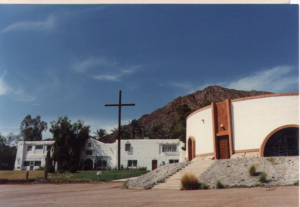 Being a member of Miles Jesu meant having an ordinary job and going to work every day. Paul was an architect and quickly found a good position in Arizona, where the community was based. He became immensely popular at work. He was conscientious and good at his job, unpretentious and cheerful – a really good colleague. He would work hard, turning up on time and rarely staying late, saying that to over-work is to lose efficiency. After working at various architectural projects, he joined the family firm established by Mr. George Christensen. It was small, and based at Mr. Christensen’s own home. In the years that Paul worked there, it expanded successfully – they built their own office and employed five more full-time architects. Paul played a central part in this success. His talents were backed by a genuine dedication to his work, and an ability to make the working day cheerful and pleasant for everyone around him. He was trustworthy and happy to help other colleagues, helped to make a group of people feel like a team, and could always see the lighter side of things.
Being a member of Miles Jesu meant having an ordinary job and going to work every day. Paul was an architect and quickly found a good position in Arizona, where the community was based. He became immensely popular at work. He was conscientious and good at his job, unpretentious and cheerful – a really good colleague. He would work hard, turning up on time and rarely staying late, saying that to over-work is to lose efficiency. After working at various architectural projects, he joined the family firm established by Mr. George Christensen. It was small, and based at Mr. Christensen’s own home. In the years that Paul worked there, it expanded successfully – they built their own office and employed five more full-time architects. Paul played a central part in this success. His talents were backed by a genuine dedication to his work, and an ability to make the working day cheerful and pleasant for everyone around him. He was trustworthy and happy to help other colleagues, helped to make a group of people feel like a team, and could always see the lighter side of things.
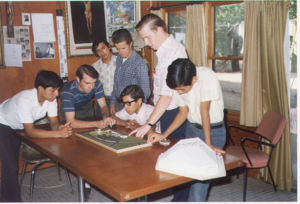 In the evenings and at weekends, Paul was with the Miles Jesu team – working with the poor, helping on community projects, running youth events. His architectural skills were put to good use on voluntary projects, and he was perfectly happy to do mundane work as well as more glamorous jobs. He designed a new home for a family who were moving to the local area, and for another family he designed and built a badly-needed cesspool.
In the evenings and at weekends, Paul was with the Miles Jesu team – working with the poor, helping on community projects, running youth events. His architectural skills were put to good use on voluntary projects, and he was perfectly happy to do mundane work as well as more glamorous jobs. He designed a new home for a family who were moving to the local area, and for another family he designed and built a badly-needed cesspool.
Paul had a detachment from material possessions. He dressed properly for work, but had only two suits and did not yearn for lots of trendy clothes. The vow of poverty bound all community members to live as simply as possible, and ensure that everything in the house was used for the common good. At one point, it was suggested that Paul give up the gold watch he was wearing, as a sign of his commitment to poverty. Paul gave it up without a murmur.
Paul was never greedy, but joked about enjoying his food, especially chocolate chip cookies, of which he was very fond. He went to social events, especially when an architectural project was finished and there was a celebration to mark the completion of a new house for a satisfied client. He was popular at parties because of his sense of fun, and his ability to make others feel that they were special and that he was enjoying their company. He always managed to be a lively part of any celebration, but in fact on such occasions he never drank alcohol and never stayed late. His first commitment was always to Miles Jesu and to the promises that he had made, to live simply and as a member of a consecrated community. People enjoyed his company and liked having him about. He exuded a sense of joy and confidence in life, and made others feel better and happier when he entered a room. He was always ready to give himself generously to any project on hand with which the community was involved. He had excellent health, and never seemed to catch any illness that was going about.
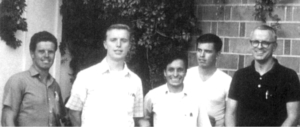 It was at a professional conference – a meeting of the American Institute of Architects in Tucson, Arizona – that Paul first fell ill. Quite suddenly, with no warning that anything was wrong, he had a seizure and passed out. He was unconscious for about 45 minutes. Of course a doctor was called, but initially no one could find anything wrong. Once he was back home with the community, however, it was decided that a second opinion was needed. A specialist was called. After a detailed series of examinations and several X-rays, grim news emerged. Paul had a serious brain tumor. It was on top of the pituitary gland, and therefore inoperable. The tumor was cancerous. Paul was going to die. When the news was given to Paul, he received it with typical good humor, saying that the tumor was probably made of chocolate chip cookies. His courage and goodwill were never to desert him even in the very grim and painful months ahead. At first, Paul was able to carry on working. No one could foretell exactly what the next symptoms would be, or when real pain would strike. He continued to see various doctors. One summer afternoon, coming back from a medical examination, he was asked what the doctor had said. “He told me to get my Christmas shopping done early!” Paul was never to lose his natural sense of humor, but he and everyone else understood perfectly well the reality that he had only a few months to live. The treatment to try to reduce the tumor involved drugs that robbed Paul of his good looks, making his face puffy and fat and causing his hair to fall out. People were shocked when they saw him – but found that he was the same patient, good humored, gentle and faith-filled man they had always known. As the weeks and months of his illness wore on, he seemed to grow in calmness of spirit. There was a great peace about him. He was courageous in facing his medical treatment, and always keen to put other people at their ease if they now felt awkward in his company. When his hair looked particularly terrible, falling out in odd patches, a friend of the Miles Jesu community came to try to make it neater. The hum of the clippers sent Paul to sleep. When Paul awoke, his first idea was to make the young “barber” feel that he had done a good job, and he assured him that he was really pleased with what he saw in the mirror. The young man never forgot this courage: Paul’s hair was a mess and the barber had done his best, but he was touched by Paul’s evident concern to make him, as the barber, feel all right. He also never lost his cheerful good humor, and his easy way of coping with all odd situations. Patricia Hudock, who was working with Miles Jesu at this time, remembers: “Someone gave us a car – convertible – I think an old Cadillac – one of the ugliest cars you could possibly imagine. It was purple and black, with big fins in the back. At the time, Paul was undergoing chemotherapy, his face was like a big moon and splotches of hair were missing because of the treatment. The convertible was the only car available to take him to the hospital that day. Something was wrong with the car’s top and it wouldn’t go up for some reason, and Paul’s skin was especially sensitive to the scorching Arizona desert sun because of his sickness, so he put on a broad straw hat for protection and went off in that big ugly convertible with the top down, cheerful and joking as if it were a smooth air-conditioned Mercedes. Paul was just great – he didn’t define his worth by external trappings.”
It was at a professional conference – a meeting of the American Institute of Architects in Tucson, Arizona – that Paul first fell ill. Quite suddenly, with no warning that anything was wrong, he had a seizure and passed out. He was unconscious for about 45 minutes. Of course a doctor was called, but initially no one could find anything wrong. Once he was back home with the community, however, it was decided that a second opinion was needed. A specialist was called. After a detailed series of examinations and several X-rays, grim news emerged. Paul had a serious brain tumor. It was on top of the pituitary gland, and therefore inoperable. The tumor was cancerous. Paul was going to die. When the news was given to Paul, he received it with typical good humor, saying that the tumor was probably made of chocolate chip cookies. His courage and goodwill were never to desert him even in the very grim and painful months ahead. At first, Paul was able to carry on working. No one could foretell exactly what the next symptoms would be, or when real pain would strike. He continued to see various doctors. One summer afternoon, coming back from a medical examination, he was asked what the doctor had said. “He told me to get my Christmas shopping done early!” Paul was never to lose his natural sense of humor, but he and everyone else understood perfectly well the reality that he had only a few months to live. The treatment to try to reduce the tumor involved drugs that robbed Paul of his good looks, making his face puffy and fat and causing his hair to fall out. People were shocked when they saw him – but found that he was the same patient, good humored, gentle and faith-filled man they had always known. As the weeks and months of his illness wore on, he seemed to grow in calmness of spirit. There was a great peace about him. He was courageous in facing his medical treatment, and always keen to put other people at their ease if they now felt awkward in his company. When his hair looked particularly terrible, falling out in odd patches, a friend of the Miles Jesu community came to try to make it neater. The hum of the clippers sent Paul to sleep. When Paul awoke, his first idea was to make the young “barber” feel that he had done a good job, and he assured him that he was really pleased with what he saw in the mirror. The young man never forgot this courage: Paul’s hair was a mess and the barber had done his best, but he was touched by Paul’s evident concern to make him, as the barber, feel all right. He also never lost his cheerful good humor, and his easy way of coping with all odd situations. Patricia Hudock, who was working with Miles Jesu at this time, remembers: “Someone gave us a car – convertible – I think an old Cadillac – one of the ugliest cars you could possibly imagine. It was purple and black, with big fins in the back. At the time, Paul was undergoing chemotherapy, his face was like a big moon and splotches of hair were missing because of the treatment. The convertible was the only car available to take him to the hospital that day. Something was wrong with the car’s top and it wouldn’t go up for some reason, and Paul’s skin was especially sensitive to the scorching Arizona desert sun because of his sickness, so he put on a broad straw hat for protection and went off in that big ugly convertible with the top down, cheerful and joking as if it were a smooth air-conditioned Mercedes. Paul was just great – he didn’t define his worth by external trappings.”
At the end of that year, 1975, Paul and his brother Don – also a member of Miles Jesu – went home to their parents for a family visit. It was a special time that Paul’s parents would long remember. When he returned home to the Miles Jesu community, they all went to Benediction together. Afterwards, Paul lingered to pray, as he had so often done before. But now it seemed hard to get him to leave the chapel. “Let me stay” he begged quietly. He was becoming closer and closer to God. But that evening he was, as always, a pleasant and cheerful member of the community.
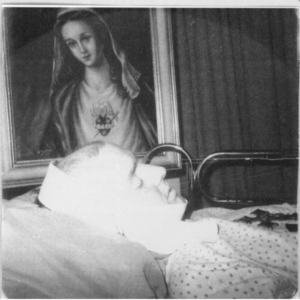 The next morning, Paul was not in the chapel for Mass. As he was never late, members went to his room to see what was wrong. They found him holding his head and when asked if he was in pain, he said “a little bit”. He never complained, and they knew that he was in real agony. They helped him back to bed, but he would not stay and badly wanted to pray in the chapel. He was kneeling there when he had a series of bad seizures. His brother Don laid him on the floor and an ambulance was called. Though Paul was rushed to the hospital nothing could be done, and he went into a coma around 7 p.m. on Christmas Eve, 1975. Paul lingered for five weeks in the hospital. He bore his sufferings with great courage
The next morning, Paul was not in the chapel for Mass. As he was never late, members went to his room to see what was wrong. They found him holding his head and when asked if he was in pain, he said “a little bit”. He never complained, and they knew that he was in real agony. They helped him back to bed, but he would not stay and badly wanted to pray in the chapel. He was kneeling there when he had a series of bad seizures. His brother Don laid him on the floor and an ambulance was called. Though Paul was rushed to the hospital nothing could be done, and he went into a coma around 7 p.m. on Christmas Eve, 1975. Paul lingered for five weeks in the hospital. He bore his sufferings with great courage
When people are in a coma, they can nevertheless often hear what is said. The local bishop had visited Paul 2 or 3 times when he was still conscious. He came to see him another time when he was in a coma, and talked gently to him, asking him to squeeze his hand in answer to his questions. Paul – who was now blind as a result of the tumour – responded to the questions by squeezing the Bishop’s hand. Paul’s courage drew admiration from the nurses and all who tended him. Everyone who visited him in his last days seemed to draw strength and peace from his presence. Eventually, when it became clear that Paul was in his last days, he was moved to a house run by Miles Jesu, where he would receive 24-hour care from members of the Miles Jesu “family”. The nurse who cared for him at the very end remembered later how she had picked up a crucifix (in fact, it was one which had been left for Paul by the Bishop) and placed it on the pillow saying “Paul, you are in the arms of Jesus”. Tears welled up in Paul’s eyes “I believed then, as I do now, that they were tears of joy, not sorrow”. A few hours later he died.
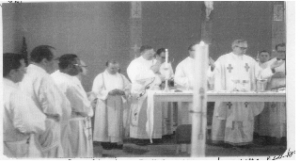 As news of his death spread, there was a great outpouring of loving and affectionate memories. This was a young man who in his professional life as an architect, in his family life as a brother and a son, and in his committed life as a consecrated member of a Catholic Lay Institute, had given and received love on a huge scale. Work colleagues, friends, family members, local children, all cherished memories of his humor, his courtesy, his kindness and affection. Members of his own community remembered his devotion in prayer, his deep love of the Virgin Mary, his unselfconscious dedication to his calling. Those who worked with him in the architectural firm remembered that in his presence no one used filthy language or blasphemed – although usually building sites have no shortage of obscenities and bad language. Young boys who were members of youth groups that he had helped to run remembered how he taught them never to forget to pray the Rosary, and had shown them by word and example what it is to know and love God. People recalled his way of making everyone feel at ease, his personal humility, his readiness to be corrected, his complete absence of any desire to show off or brag. At the funeral, people were already speaking of Paul Murphy as extraordinary. Large numbers of young people attended, and the Bishop, the Most Rev. Edward A. McCarthy, spoke of Paul as being “the flowering of the young people of our diocese”, as he had inspired and helped them in so many ways. He highlighted the things that had made Paul Murphy so attractive a personality, “his spirit of faith, his spirit of peace of heart, his spirit of reaching out to follow the will of God and to serve his brothers and sisters”.
As news of his death spread, there was a great outpouring of loving and affectionate memories. This was a young man who in his professional life as an architect, in his family life as a brother and a son, and in his committed life as a consecrated member of a Catholic Lay Institute, had given and received love on a huge scale. Work colleagues, friends, family members, local children, all cherished memories of his humor, his courtesy, his kindness and affection. Members of his own community remembered his devotion in prayer, his deep love of the Virgin Mary, his unselfconscious dedication to his calling. Those who worked with him in the architectural firm remembered that in his presence no one used filthy language or blasphemed – although usually building sites have no shortage of obscenities and bad language. Young boys who were members of youth groups that he had helped to run remembered how he taught them never to forget to pray the Rosary, and had shown them by word and example what it is to know and love God. People recalled his way of making everyone feel at ease, his personal humility, his readiness to be corrected, his complete absence of any desire to show off or brag. At the funeral, people were already speaking of Paul Murphy as extraordinary. Large numbers of young people attended, and the Bishop, the Most Rev. Edward A. McCarthy, spoke of Paul as being “the flowering of the young people of our diocese”, as he had inspired and helped them in so many ways. He highlighted the things that had made Paul Murphy so attractive a personality, “his spirit of faith, his spirit of peace of heart, his spirit of reaching out to follow the will of God and to serve his brothers and sisters”.
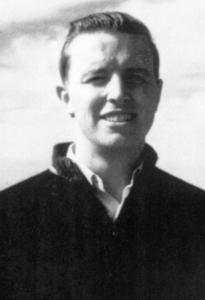 Today, we need saints who live and work as ordinary people, who respond to God’s call to transform daily life and make it holy. We need examples of men who know what it is to do professional work well, to live simply and with justice, not taking too much account of material goods, but accepting what God offers and using everything in a way that would please Him. We need to see men at prayer, and to know that this is a normal part of life, to see men passing on the Faith to the next generation with joy. We need examples of men who serve God with discipline, leadership and strength. We need examples of chastity, from men who show what it is to be a Christian man who knows that virginity is the normal state of the single person, and that sexual union is reserved for marriage alone. We need to see men who inspire joy and serenity in others, who are good neighbors and honest and reliable friends. Holiness is not something reserved for priests or nuns. It is meant to be practiced in shops and offices, homes and schools. It is something for every day, and for every situation. It is not something “soft” and sentimental: it’s something for men and women who face the daily challenges of life with courage, and who live up fully to their responsibilities. Paul Murphy’s life was the life of a Catholic man who lived the virtues of a Christian in an everyday way, but to a high degree. He was not called to do anything remarkable – he did not found a great religious order, or perish through martyrdom in some public way, or become involved in great matters of international importance. But he lived in a way that drew others to Christ, and showed through his joy in doing this that it is the normal task of a Christian. We are all called to be saints. Here is one who answered the call, and answered it gladly. As someone who lived with Paul in community recently said, “Many people ask for concrete evidence about Paul Murphy’s life, how he lived, what he did, what he was like. We never saw him perform any miracles, but the way he lived life was a miracle. He lived the hidden life of Christ and the Blessed Mother, living a very ordinary life in an extraordinary way. We believe that this is what it takes to be a saint.” Clearly, Paul Murphy was a man to move hearts.
Today, we need saints who live and work as ordinary people, who respond to God’s call to transform daily life and make it holy. We need examples of men who know what it is to do professional work well, to live simply and with justice, not taking too much account of material goods, but accepting what God offers and using everything in a way that would please Him. We need to see men at prayer, and to know that this is a normal part of life, to see men passing on the Faith to the next generation with joy. We need examples of men who serve God with discipline, leadership and strength. We need examples of chastity, from men who show what it is to be a Christian man who knows that virginity is the normal state of the single person, and that sexual union is reserved for marriage alone. We need to see men who inspire joy and serenity in others, who are good neighbors and honest and reliable friends. Holiness is not something reserved for priests or nuns. It is meant to be practiced in shops and offices, homes and schools. It is something for every day, and for every situation. It is not something “soft” and sentimental: it’s something for men and women who face the daily challenges of life with courage, and who live up fully to their responsibilities. Paul Murphy’s life was the life of a Catholic man who lived the virtues of a Christian in an everyday way, but to a high degree. He was not called to do anything remarkable – he did not found a great religious order, or perish through martyrdom in some public way, or become involved in great matters of international importance. But he lived in a way that drew others to Christ, and showed through his joy in doing this that it is the normal task of a Christian. We are all called to be saints. Here is one who answered the call, and answered it gladly. As someone who lived with Paul in community recently said, “Many people ask for concrete evidence about Paul Murphy’s life, how he lived, what he did, what he was like. We never saw him perform any miracles, but the way he lived life was a miracle. He lived the hidden life of Christ and the Blessed Mother, living a very ordinary life in an extraordinary way. We believe that this is what it takes to be a saint.” Clearly, Paul Murphy was a man to move hearts.
Text taken from Man to Move Hearts from Joanna Bogle and Stephen Ryan.
